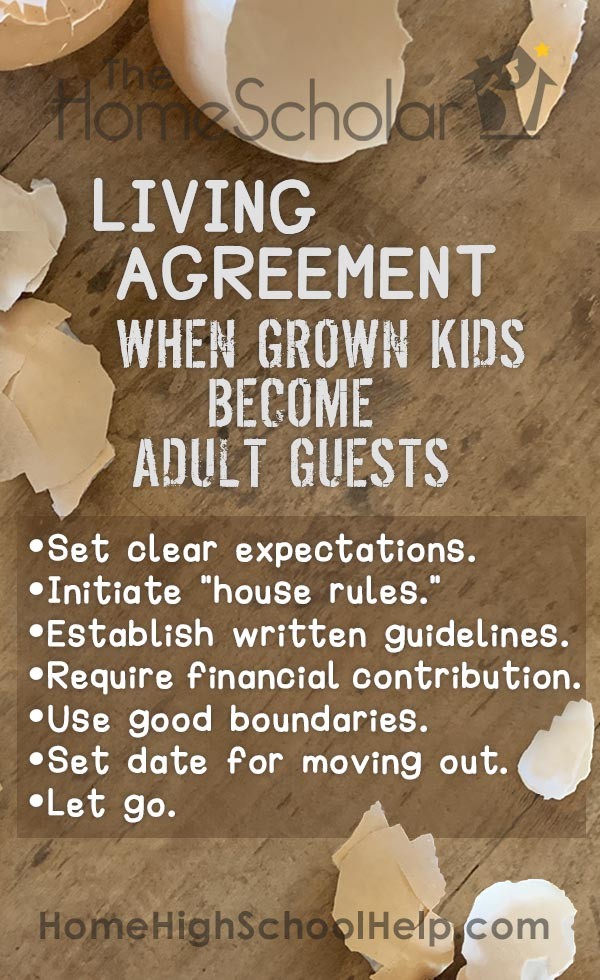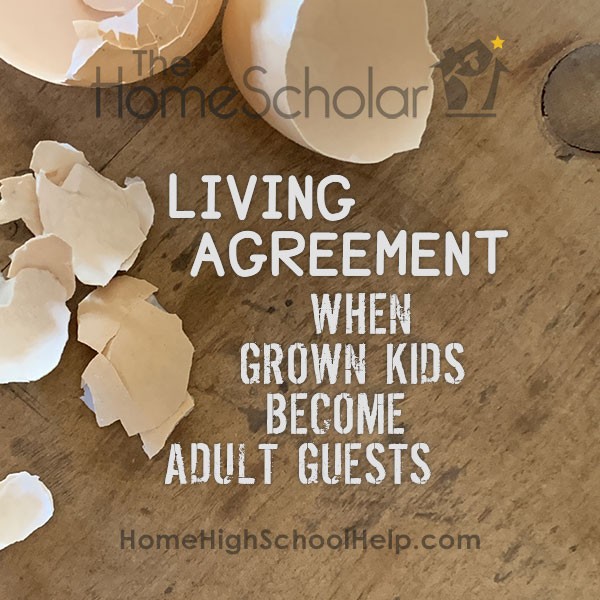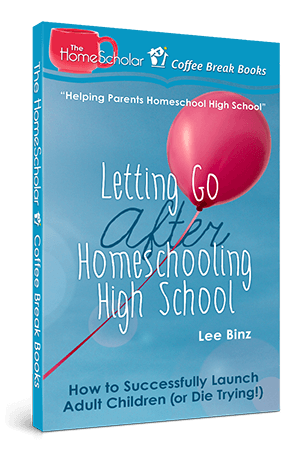

Have you found yourself with adult children living in your house again? Whether you're experiencing this now—or curious about how it could work in the future—read on for some guidelines that will help your family function as smoothly as possible when grown kids become adult guests.

When children have finished high school, life can get pretty complicated. Some children graduate and move on to college or career smoothly. In a perfect world, we might be financially secure enough to support our children after graduation. We may want to provide financial support when they are in college full time, or when they are employed full time, so they can save some money.
Other newly-minted adults are dragged into adulthood kicking and screaming. I've had parents reach out to me for advice when it's a challenging time. This is a judgement-free zone, and we are all among friends here. It's ok to confess that sometimes things don't go perfectly. I understand that it can get "less perfect" when your student is neither in college nor employed. It's more challenging than others can understand if they have no drive, ambition, self-employment, plans, or prospects. I understand that we can't control our children's adult decisions.
Once your children are 18, it becomes much more difficult to tell them what to do. We have spent 18 years training them to become independent-minded, self-directed adults. And yet somehow, when it actually happens, it's pretty annoying, to be honest. So when our children grow into adulthood, with their own minds, but also have no plans or prospects, it's a real challenge for parents. It becomes even more difficult when our grown children live in our home. That's when you start to realize that having a home with more than two adults can be challenging. It was difficult when my children came home from college, as we would navigate their new-found adult boundaries.
After high school, they look like adults, and in many ways can act like one too. While that sounds wonderful, it can also cause unexpected and surprising stresses. It can make you feel like you have an extra spouse, with their own set of demands, requirements, opinions, considerations, and feelings. That's exhausting, leaving the parent underappreciated and overwhelmed. Just for today, let's talk about what happens if things go poorly, stresses become overwhelming, and you realize that something needs to change or there will be an explosion of emotion.

That's when you realize they are becoming adult guests, rather than children to be parented. This transition is important, so they can learn from their own mistakes. If they are constantly guided (perhaps through nagging or reminders) they can't learn independence. When this starts to happen, that's when you need to develop a living arrangement that is agreeable for adult guests. When you change the mindset to adult guests, you have framework for moving forward as they get older and even more independent. They should act like guests. If things get bad, you really can ask them to leave—as you would any other adult guest—if they violate your requirements. Some parents refer to their room as "The Guest Room."
Set clear expectations for what makes a "good roommate." A good roommate would not leave for days without saying where they were going. They would not create a horrendous mess or fight with the other roommates (meaning siblings) about mundane expectations. Talk about how clean they should keep their surroundings and when they should they notify you of their comings and goings. Openly discuss your values, your feelings about overnight friends, and public displays of affection.
Initiate "house rules." Decide what your reasonable requirements would be for an adult to be a guest in your home. Reasonable requirements include: no physical or emotional abuse; no drugs or underage drinking in the house; no smoking or vaping in the house; no porn, R-rated, or TV-MA viewing in the house; no using the host computer or car without permission; keep the guest room and guest bath reasonably clean.
Establish clear written guidelines and expectations. Include a plan for what you will do if core rules are broken, with simple if-then statements. For example, "If I see you drunk, then you will not be allowed to live in my home." A good parent encourages children to grow into adults and doesn't enable immaturity that can immobilize children into consistent dependence. The natural consequence of being a "bad roommate" is being told they aren't a roommate anymore.

Allowing a student to live in your home for free with no time limitation removes an incentive to work and become self-supporting. You don't want to rob your children of that important motivation and life skill. Set clear expectations of what you will and won't pay for, so they can learn to pay their own way. Reasonable limits might mean you will pay for most utilities but not their cell phone. You might pay for family food but not special requested food. Reasonable finances means you do not provide spending money, or pay for luxuries, requests, toys, or entertainment.
Set time limits on how long they can live with you so they can consider their future finances. Consider holding the "rent" in an account that can be handed to the teen if they need assistance with the deposit needed for their first apartment, since "first and last month's rent" is usually required.
Good parents set boundaries, and overstepping boundaries should lead to natural consequences. If conflict occurs, take your time and think before giving an emotional response. It's a good idea to say, "I need to talk to my spouse. I'll get back to you." That will give you time to take a breath, restore calm, and make appropriate decisions. If the relationship becomes emotionally or physically abusive, immediately separate.
You are responsible for children. When children are grown, though, you are responsible for only yourself and your spouse. You are not responsible for another grown adult outside of your marriage. You have the option of including adult guests in your home, but that's not a requirement or expectation of any parent. Sometimes I see parents who say they want their children to live with them forever.
Letting go of adults is a sign of success. Preparing your heart and home for the inevitable transition from homeschool to adulthood will enable both you and your teen to step confidently into the next phase of life. I encourage you to read Letting Go after Homeschooling High School: How to Successfully Launch Adult Children (or Die Trying!). In this book, you will learn how to prepare your teen for independent living, launch your child into adulthood, say goodbye with love and grace, and face the empty nest with joy and anticipation.

Learn more in my video review below!